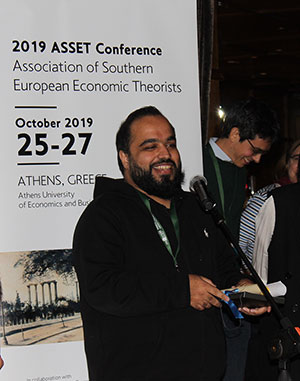The Louis-André Gérard-Varet prize* for the best paper by a young researcher was awarded to Shahir Safi, AMSE post-doctoral fellow, at the ASSET conference in Athenes, in October 2019.
The paper "The Weakness of Weak Ties in Referrals" studies the returns to using referrals depending on the abilities of the workers and the type of ties.
In the literature, the pioneering works of Granovetter (1973, 1974) discovered that a large proportion of jobs are found through weak rather than strong ties. Weak ties refer to acquaintances and strong ties to close friends.
The author argued that the weak ties to individuals with whom one has few common friends are most useful for job search, because they provide access to otherwise unobtainable information about job openings. This finding led to the coining of the well-known phrase, the “strength of weak ties”.
However, subsequent studies have also found the frequent use of strong ties, and overall, the empirical evidence on the relative use of weak versus strong ties is mixed.
The conclusion of Granovetter is linked with its conception of « referals » which he understands as a mechanism for finding job vacancies. On the contrary, many economists have argued that the widespread use of referrals is because employee recommendations can help screen job applicants: when there is asymmetric information about the abilities of applicants, employees can “signal”(recommendation letters or put in a good word) some of this information to firms by recommending workers they personally know.
In his model, S. Safi uses this recommendation aspect of referrals to explain their ambivalent or mixed empirical effect on labor market outcomes.
He concludes that the benefits to using referrals varies with the abilities of workers and the types of ties or relationships. Low ability workers can get higher wage offers by using acquaintances, while high ability workers can get higher wage offers by using close friends.
His model can help explain the mixed empirical evidence about the wage diferentials between the two types of ties. It also accounts for the mixed empirical effect about the wage differentials between referral-based and market-based hires.
*This prize is in memory of ASSET’s first elected president Louis- André Gerard-Varet, who passed away in January 2001. Louis- André Gérard-Varet was Directeur d'Etudes at EHESS, and Director of GREQAM in Marseille. He was ASSET’s chairman from 1990 to 1997 and its president from 1997 to 1999.
ASSET awards the Louis-André Gerard-Varet prize each year to a young author (either a current graduate student or a recent PhD within two years of graduation) of an outstanding paper singled out by the program committee among those submitted to the ASSET annual meeting. The recipient of the prize must be attending the annual meeting, and in the case of co-authored papers, all authors must be individually eligible.







